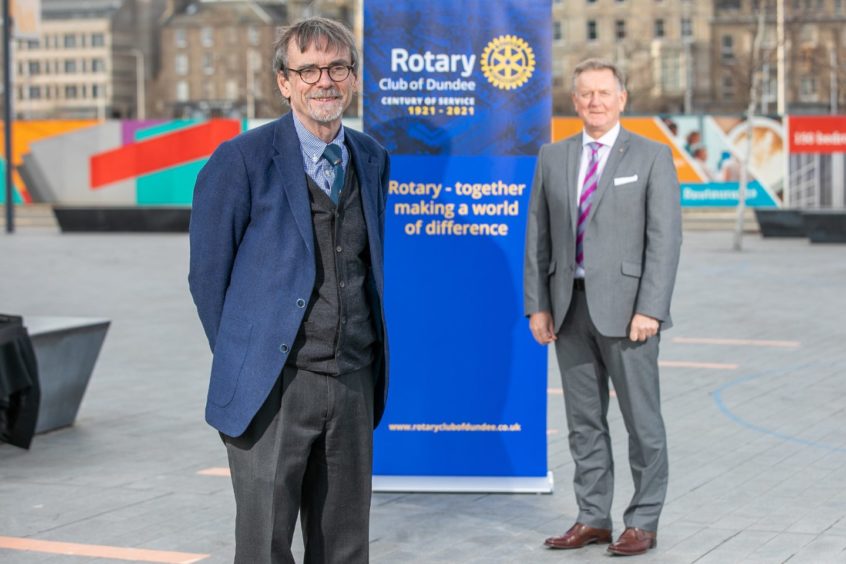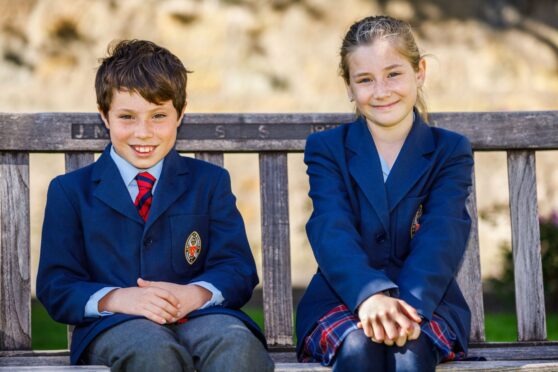Dundee Rotary Club is providing vital funds to complete a medical research project aimed at saving lives through earlier detection of serious illnesses.
As part of a £100,000 windfall for good causes in and around the city to mark the club’s centenary year, £11,000 has gone to support a bowel screening campaign which has rolled out across the UK since its creation locally.
Project leader Professor Bob Steele said the population of Dundee would hugely benefit from the research because of the city’s high levels of multimorbidity – people affected by two or more chronic conditions.
His team at Dundee University is currently working on a significant development of the successful screening programme.
They need £11,000 to complete their work over the next 12 months and the Rotary Club has stepped up with the crucial funding.
Dundee Rotary marks milestone anniversary with £100,000 of charity donations
The bowel cancer initiative has already saved thousands of lives of people over the age of 50.
The disease can affect one in 20 people, but is one of the most treatable forms of cancers if detected early through faecal haemoglobin – blood in stool samples.
Professor Steele’s team developed the screening programme to identify bowel cancer in its early stages and greatly increase chances of positive outcomes through early treatment.
Further research has now opened the distinct possibility of Faecal Immunochemical Testing (FIT) being developed to detect early signs of other serious illnesses such as heart disease and diabetes.
Life expectancy falling
Professor Steele said multimorbidity is the major cause of premature death and ill-health in developed countries.
“In Scotland life expectancy is falling with an urgent need to reliably identify people at risk of developing multimorbidity or people who are living with undiagnosed conditions,” he said.
“This would allow for preventative measures and early intervention to reduce the burden of disease.
“Recent studies using data from the bowel screening programme show that the presence of faecal haemoglobin is associated with increased risk of death from a number of long-term conditions unrelated to bowel cancer.
“There is also evidence that it is associated with some long-term conditions including diabetes, heart disease and high blood pressure.
“If this phase of the study is successful, we could move to a phase where people with faecal haemoglobin who are found not to have bowel cancer would be offered a health questionnaire to complete, and if significant concerns were identified they would be offered a consultation.
“This would have significant benefits to the individual and to the health care system.
“Dundee has high levels of multiple morbidity and the city’s population would significantly benefit from this research.
Scottish programme run from Dundee
“Scotland ‘s bowel screening programme is run from the Bowel Screening Centre in Dundee, making it the ideal location for the project,” added Mr Steele.
“The research team in Dundee is delighted to have this donation from the Rotary Club of Dundee, as it allows us to take this important research forward to a stage where it could have a significant clinical impact.”
Robert Dunn, chairman of the Rotary Club’s centenary committee and a former president said: “We are delighted to support this very worthwhile medical research project with Professor Bob Steele and his team at Dundee University.
“This is another donation made this year as part of our £100,000 set aside by the Rotary Club of Dundee in recognition of the club’s 100th anniversary.”
Dundee pupils to benefit from new £24,000 project to help studies
Previously announced centenary fund projects include a £25,000 bursary scheme for post graduate design students at Duncan of Jordanstone College and a £24,000 pilot project to provide tutoring support for pupils at four Dundee secondary schools whose education has been disrupted by the pandemic.
£10,000 has also gone towards a matched funding agreement with the Nine Incorporated Trades of Dundee which will see grants of £2,000 awarded to 10 local charities to mark the launch of the centenary year in May.







